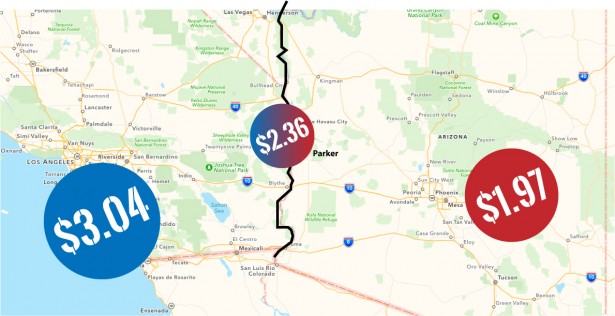Here’s a Parker Live reader with a common question:
“I’ve watched fuel prices go up and down like we all have, but over the last year it seems prices nationally have fallen everywhere but here. Even in Bullhead City, the price of fuel seems to be lower. I understand taxes play a role, but with the price at the pump falling nationally, why aren’t they falling here?”
– Getting Annoyed Seriously
When you compare the price of a gallon of gas in Parker, AZ with the same gallon in other places, a few things can jump out at you, GAS.
First, its important to note that you’ll pay much less in Parker than you will in the Inland Empire, Orange County, San Diego or Los Angeles. The average price per gallon of regular unleaded (87 octane) in the state of California is $3.04 today, while the average price per gallon in Parker is $2.36 – 68 cents less.
Part of this difference can be attributed to the difference in tax: almost 50 cents of every gallon of gas in California goes to state excise tax and other state taxes and fees, compared to an equivalent amount in Arizona of less than 37 cents. There’s also a difference in the ‘priced to market’ value of gas, and we’ll come back to why this may be important in a moment.
But what you’re really asking, GAS, is why we pay more in Parker than the Arizona average, which at just $1.97 per gallon is roughly the same as the nationwide price for a gallon of regular. (Whatever the nationwide price is, the Arizona price is usually pretty close.)
That’s a very good question. Why do we pay more? And what are the factors affecting the price? KLPZ’s Keith Douglas says he’s never lived in a place with a low price of gas. That sounds familiar to me! So let’s consider some answers.
First things first: let’s compare today’s average prices in Parker to other nearby cities, and the Arizona average.
You’re right, GAS, Bullhead’s prices are pretty great! So what could possibly account for these differences?
According to the AAA, there are many factors that go into the price of fuel. Unlike an iPhone or a Whopper with cheese (a ‘Chopper’?), gasoline – derived from crude oil – is a commodity, and its price is not based on what it costs to produce but what it costs to replace. This is true at the New York Mercantile Exchange and it’s just as true on Riverside Drive in Parker.
Here’s a very crude summary (see what I did there?) of how it works. Gas wholesalers each have their own formulas for setting their ‘rack price’, which is based on the cost of oil and a bunch of other things, including their profit. Every day, these wholesalers will tell the gas station owners what the rack price will be for the next 24 hours. The gas station owners hire trucking companies to bring them gas, and those trucking companies will charge for that service, all of which gets added to the price the gas station owner decides to charge customers, which they will ultimately base on the local market (what their competitors are charging here in Parker).
With me so far?
There are typically only a few pennies per gallon in profit for most station owners, who make more profit from their convenience stores than from the gas itself. But one possible variable, if we want to truly understand why customers in Parker will spend 42 cents more than customers in Bullhead for the same thing, may be the costs of transportation. And that’s by process of elimination: there’s no difference in refining cost and profit (approximately 10 percent of the price of gas); there’s no difference in the price of crude (67 percent of the price); there’s probably not all that much difference in taxes and fees for gas stations in Parker as compared with Bullhead (13 percent of the price).
So perhaps freight charges for carriers going out of their way on Highway 95, bringing gas along a corridor without a major metro area along it, or the promise of one at the end of it, adds to the price of freight in a way that increases the price of a gallon by 30-40 cents?
That seems like the likeliest answer to me, GAS, but some people don’t buy it. (Pun intended.) A popular alternative theory is a claim that’s often made by Parker and Havasu people, and it goes something like this: Gas stations know they have a captive crowd who have no choice but to pay for their precious liquid whatever the price is, so they’re colluding with each other to keep the price high. Sound familiar?
Only gas stations know their own costs and revenues, so I can’t give you a definitive answer about whether the price-gouging conspiracy is true or not. But it sure seems likelier to me that the price differences between cities are due to the big factors that impact costs – transportation, freight capacities and routes, regulations and the like.
I realize that may not be a very satisfying answer, GAS, so let me offer a third possibility.
Earlier I mentioned the ‘priced to market’ value of gas. The truth is that the Colorado River corridor is a hybrid market, revolving economically around a large California-Arizona community of comers and goers, the vast majority of whom have high-octane interests and lifestyles (even if that just means driving a truck and driving it for long distances fairly often) and many of whom are used to paying much more for gas than the average citizen of the A.Z. So perhaps it isn’t super surprising that the market value of gasoline in Parker tends to lie somewhere between the California and Arizona averages.
And who might set those prices? Well, perhaps those gasoline wholesalers are pretty smart about the markets (and hybrid markets) they’re delivering to, and what they may be willing to pay? I don’t know for sure. Weigh in on our poll where you can suggest your own answer!
Thanks for the question, GAS. The answer is as clear as crude.
JW
 Parker Live News from the Parker Strip since 2009.
Parker Live News from the Parker Strip since 2009.






Because they can.
Gas is $1.67 a gallon in Houston
Exactly…I can’t wait until the new gas stations are built to help drive them down. Otherwise a simple boycot of two-three days should bring them down to reasonable levels.
I’m Thankful I’m not paying 3.04.
So now the question is, when CRIT opens its stations and they are not subject to the same taxes I would imagine their prices will be lower. If that is the case will the other stations suddenly bring their price of gas down to remain in competition or will they go out of business. If they go down in price then why didn’t they do that sooner as a sign of goodwill to convince their customers to continue buying from them when the new competitors come on line.
Paid $2.249 today at Mac’s Market with my 76 card. Better than the $3.399 I paid in California with the same card.
Just paid 1.68 yesterday afternoon in cypress Texas
It’s going to be really interesting to see what will happen to the prices once the tribes open their stations. I personally believe the stations here are price gouging. There are places in California where the gas prices are cheaper than ours – in Studio City in October, for example, I got gas for $1.94.
1.89$ in flagstaff
Heck, if I were the gas stations, I would collectively raise prices by ten cents 😉
Joe Sena your always asking, so here’s your explanation! Lol
I heard only the station out by the hospital will open.
1.96 in Kingman
Thank you John Wright for the last line of your article: Thanks for the question, GAS. The answer is as clear as crude
That made me laugh!!
Only one problem with this article is that In Lake Havasu for the past two months it has been cheaper to buy gas in Parker than Lake Havasu!! lol, Yup! Check my photo album…. lol, I have been posting daily gas prices for several months
The letter mentions Bullhead more, because you’re right, Havasu and Parker tend to be in the same ballpark. Both are much higher than the AZ average.
$5.50 in Paniment Springs, west entrance to death valley.
But yet still in AZ and trying to be Cali is just wrong on many levels.
Did anyone mention we have higher sales tax?
For sure!
Yes they can,whatever the price,it will still be paid,sad
They do it because they can and we still pay for it!
Gas did go down 10 cents in Parker yesterday. Funny nobody thinks high sales tax is part of the problem?
Well the sales tax it too high also!
Correct me if I’m wrong, but Parker’s sales tax rate is 7.6%, while Bullhead and Havasu are at 7.85%. If that’s true, then it can’t be a factor affecting the difference in gas prices.
Parker is 9.6%
There is a refinery in parker south. They ship gas to a lot of stations in the area and beyond… so I don’t buy the legitimacy of the high transportation costs.
You mentioned on the air how much the State and Federal tax is, now add the sales tax. Now tell me who is making money on gas?
Lots of words in this article where only one is needed: greed.
California customers are getting screwed…..corner station in Costa Mesa just TODAY……RAISED prices to $2.99 / gal…..more then $1 higher then Stateline 3 hrs away.
Tax in Parker is the State and County tax rate at 7.6% PLUS the town’s 2%. 9.6%.
https://www.azdor.gov/Business/TransactionPrivilegeTax/TPTRates/LaPazCounty.aspx
But as stated earlier demand is what controls price. Keep buying it at high prices and they will continue to be high. `
In Parker i can fill up with super for the cost of regular in California. No complaints- except i am in ca now
I believe that the gas station owner are taking advantage that we have snowbirds and are trying to get more profit. On the most part the prices have not changed,when the prices everywhere else has gone down.